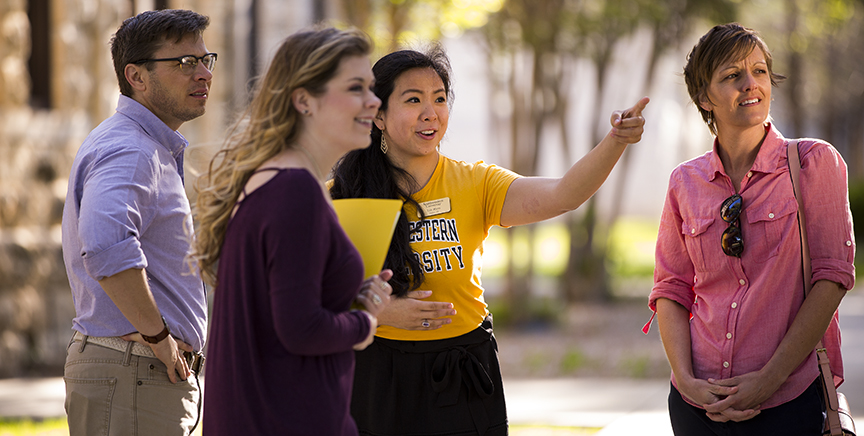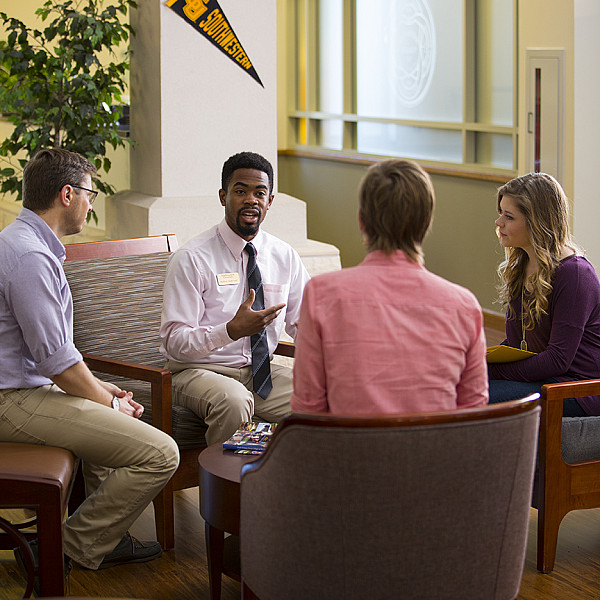News
Top 10 Questions You May Not Think to Ask on a College Tour (but Totally Should)
April 15, 2021
April 15, 2021
Open gallery

Ah, springtime. The sun is out, the birds are making even more noise, it’s 40 degrees in the morning and 80 in the afternoon, and, best of all, I can hoard even more plants without people judging me! But you know what else makes spring great, especially if you’re currently a junior in high school? It’s a great time to take advantage of the lovely weather and your week off to go on some college tours! But, although college tours are meant to be enjoyable, it isn’t just a time to sightsee. While a college can often pass or fail the vibe check just by you stepping foot on it, it’s important to have some questions ready to give you a more complete picture of what four years of living, learning, and transitioning into adulthood at your chosen school could look like.
Before diving into the list itself and in keeping with the spring theme, I want to plant some seeds for you to keep in mind. First, figure out who your tour guide is. Are they an alum? A long-time member of the staff? Both? Or are they a current student? Obviously, whoever is giving you the tour is going to be enthusiastic and knowledgeable about their institution, but a current student can often give you a better approximation of what campus life will look like for you than someone who graduated 15 years ago or who never attended the college themselves, for example. So if your tour guide isn’t a current student, definitely still pick their brain regarding what they know about the university in relation to their role and experience there, but ask about speaking to current students as well!
Second, focus your questions on things where real human input matters most. That is, you should ask questions only a person who has experienced that university can answer. While statistics such as graduation rate are important, you can google information like that pretty easily. College tours are meant to give you an impression of what your experience could look like. So instead of asking for strictly numbers, ask about how those numbers play out in real life. For example, instead of “what’s the student-to-faculty ratio?” try “how does the student-to-faculty ratio shape your classroom experience?”
Now, let’s get to the questions themselves.
“What was your experience like as a first-year?”
Being a first-year student can be intimidating. I should know—I was one! Whether it’s a particularly fun orientation week, first-year seminars, or how introductory-level courses feel coming fresh out of high school, your first year can really set the tone of the years that follow, so it’s important to get a sense of how your potential school supports its students in making such a big transition.
“What made you want to stay?”
This one is a good follow-up to asking someone why they decided to apply. After all, what attracted someone to a campus initially and what kept them there may not always be the same thing. For example, someone might initially apply because they were drawn to one major, but then maybe they took a class in a completely different discipline and couldn’t pass up the opportunity to study it. Or students might initially be drawn to the campus but end up wanting to stay because of the close-knit relationships a small school can facilitate.
“What did the process of choosing your major look like?”
This isn’t necessarily about the logistics of selecting a major but rather what the process of exploring educational paths looks like. Supporting questions may include the following:
- “Do students have a lot of freedom to explore?”
- “Is there a lot of overlap between subject areas?”
- “What does balancing seemingly unrelated majors and/or minors look like?”
“What about your first visit to this campus stood out?”
This is just another way to open the door to potential connections you may have with a university. Your tour guide may open your eyes to something you may not have noticed otherwise. Plus, it’s fun to learn how different things stand out for different people.
“What does exam season look like, and what kind of support does the university offer during these times?”
It’s pretty much a given that midterms and finals are going to stress students out, but some universities are better at acknowledging that fact than others. For example, Southwestern has hosted events like Late-Night Breakfast, where students can take a study break, have some pancakes at 10:00 p.m., and watch the Pike or KA guys belt out some karaoke. Going to a school that still encourages you to have fun and take breaks every once in a while is really valuable, and this extends even beyond finals season. I’ve certainly been lucky enough to go to a school that acknowledges the mental health of students and where the culture among the professors is really accommodating and understanding.
“What’s the surrounding community like?”
You are going to college, not boarding school, after all, so chances are you’re probably going to want to leave campus every now and again. Even if you go to a really stellar institution, you may actually start to resent it a little if you feel like you can never get away. And just as college tours are insights into life on campus, attending a school is like a sneak peek into life in that particular city, so who knows? You may find your future home as well!
“How well do professors connect with their students?”
This is taking a step beyond just asking, “Are professors available for office hours?” (Spoiler alert: the answer is yes). What you really want to know is what these office hours look like. Professors who are willing and able to connect with their students can mean the difference between feeling like you’re going in for a job interview (yikes!) just to ask a question about the homework and popping in to vent about work or talk to your professor about exciting, non-school-related life updates.
“Are the students generally able to maintain a healthy school–life balance?”
Being a student and being a person are not mutually exclusive. Just like you aren’t going away to boarding school, you’re not going to a monastery, either. Some students may want or need to have a job, and we all have hobbies we like to engage in. I myself steered away from schools or programs if I saw on their FAQs page “Can I work while enrolled?” and the response was two paragraphs explaining how the coursework would be so rigorous, it would not be humanly possible to work even part-time. Some people thrive in an all-work, no-play type of environment; it makes other people very dull. So ask yourself which camp you fall into, what compromises you’re willing to make, and whether your potential school will support that.
“How are students academically recognized?”
This is speaking from personal experience, but I recently got blindsided with several awards and honor societies I had no idea I was even a candidate for. While I’m obviously honored (no pun intended), in hindsight, it does make me wish I had inquired about these kinds of things. First, knowing what kinds of awards and honor societies are available gives you something to actively strive for, both for personal accomplishment and for your résumé. Second, a lot of these honor societies require membership dues. Now a lot of them do offer financial aid to help cover these costs, but it’s still helpful to be prepared for any and all potential expenses.
“I think I might be interested in studying/exploring ____. Are there any professors you could put me in touch with?”
This is a great way to get a feel for the culture of particular departments within a university and see whether it’s something you feel like you’d mesh well with. This may also give you an opportunity to speak to faculty about what course offerings for different majors look like. After all, you may like the idea of a particular major on paper, but seeing what the actual coursework looks like can totally change your mind. And if you do ultimately end up picking that school and have already met with a professor or two, those are more connections than you would have had otherwise.
I hope that among the sea of hundreds of potential questions, these have opened you up to new possibilities and given you some food for thought. These exact questions certainly helped me in confirming that SU was my dream school, so I hope they bring you a little closer to yours. Happy hunting!















